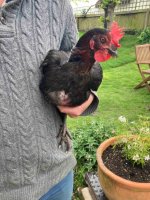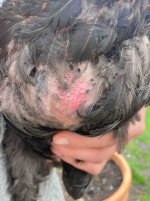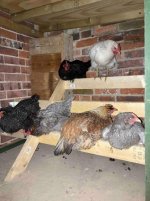Hello. I would be grateful for any advice. I have 6 hens at the moment and have been keeping hens for about 4 years. The current queen (Tikka, a Rhode Rock) has a rather sore looking chest where she has pecked away her feathers. It hasn't ever been pecked to the point of bleeding but it's obviously uncomfortable and not going away (after being there for about a month). She's about a year old. I thought previously it might be caused by an impacted crop (I've ruled that out I think), but I'm a bit stuck now without going to a vet. Thanks in advance! Photo attached.



